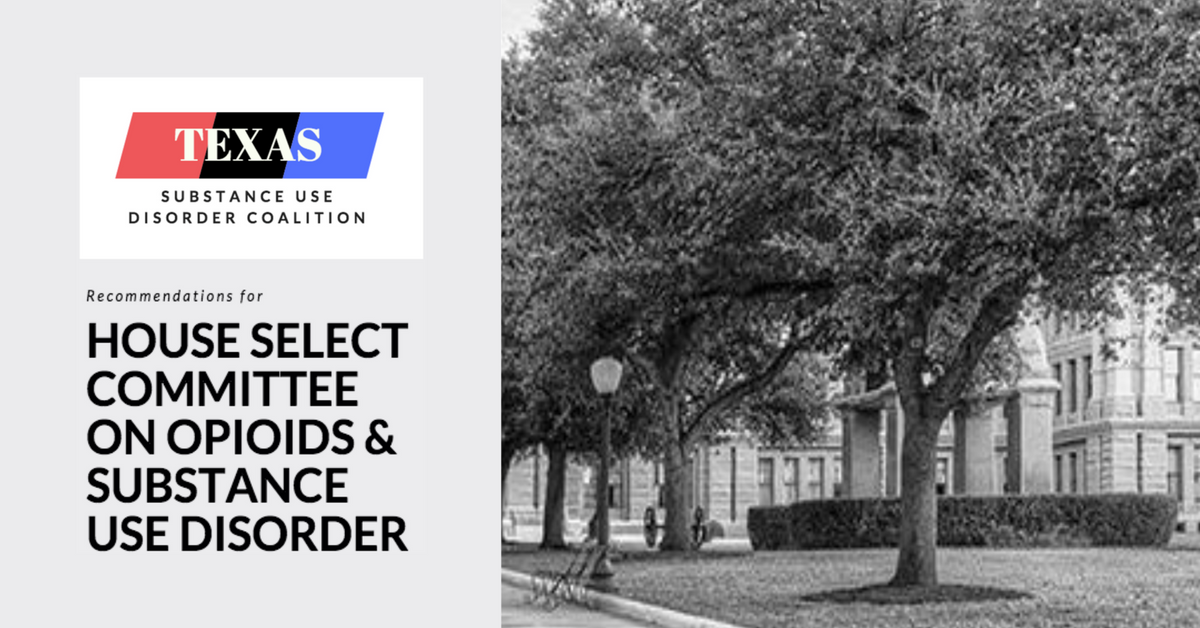Today, the Texas Substance Use Disorder Coalition released new policy recommendations to state leaders. The recommendations are available here.
Providing background on the challenge of opioid use disorder and other substance use disorders (SUD) in Texas, the Coalition notes:
Substance use disorder is a chronic illness affecting nearly one in ten Texans.1 While many people may use alcohol and drugs at some point in their lives, some will get addicted due to a variety of complex biological, behavioral, and environmental factors. With adequate treatment and support, substance use disorder is manageable, and recovery is possible, with relapse rates comparable to other chronic diseases such as diabetes, asthma, and hypertension.2
Substance use disorders, when not addressed, have devastating impacts on families and communities and are responsible for enormous costs in our state budget related to healthcare, public safety, criminal justice, homelessness, domestic violence, foster care, and social welfare programs. Unfortunately, very little funding is spent on substance use services and prevention. In Texas, less than $1 out of every $1,000 of general revenue spending goes to substance use agencies (the national average is over $4 per $1,000).6
The Coalition also notes: “The high number of uninsured individuals in Texas (4.5 million or 16.6% of Texans lack health coverage) further contributes to a system that is stretched thin.”
There is no single solution to prevent and address substance use disorders in our state. The Coalition provides recommendations in six key areas:
- Prevention
- Keeping Families Together
- Access to Appropriate Treatment Services and Community Recovery Supports
- Treatment for Co-Occurring Conditions
- Substance Use and Criminal Justice
- Public Health and Safety
As a member of the Coalition, our work at Texans Care for Children is particularly focused on the need to ensure children and families are healthy and have the supports they need to thrive. For instance, one of the best and most economical ways to reduce the burden of substance use disorder is to prevent it from occurring in the first place by helping youth build their skills to make healthy decisions. In addition, for two-thirds of children removed from their families and placed in foster care, concerns about a caregiver’s substance use was a primary reason for removal. It is clear that addressing parental substance use disorders is key to keeping kids and families together in safe, healthy homes. We are focused on the need to:
- expand the availability of school-based and community-based prevention programs for children so these programs can be available to every Texas youth, school district, community, and county; and
- Increase capacity for family-specialized and female-specialized substance use treatment programs that help parents recover and allow more children to stay safely with their family rather than entering foster care.
The Texas Substance Use Disorder Coalition is composed of a range of dedicated stakeholders, including Texans Care for Children, Association of Substance Abuse Programs, National Association of Social Workers/Texas Chapter, Texas Criminal Justice Coalition, Recovery People, Recovery Alliance of El Paso, Spread Hope Like Fire, National Alliance on Mental Illness (NAMI) Texas, Lone Star Justice Alliance, Communities for Recovery, Texas Council of Community Centers, Children’s Defense Fund-Texas, Texas Overdose Naloxone Initiative, Lone Star Justice Alliance, and the Center for Public Policy Priorities.
For additional information, please see the contacts listed at the end of the recommendations.
References
1 Substance Abuse and Mental Health Services Administration, “2015 – 2016 NSDUH State Estimates of Substance Use and Mental Disorders,” Dec. 2017. https://www.samhsa.gov/data/population-data-nsduh/reports.
2 National Institute on Drug Abuse, “Principles of Drug Addiction Treatment: A Research-Based Guide (Third Edition),” Jan. 2018, Retrieved from https://www.drugabuse.gov/publications/principles-drug-addiction-treatment-research-based-guide-third-edition.
6 The Council of State Governments, “Substance Abuse in the States: Treatment,” Oct. 2017, http://knowledgecenter.csg.org/kc/content/drug-abuse-states-treatment.


